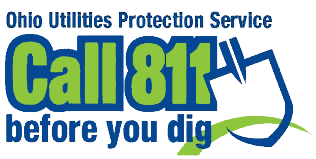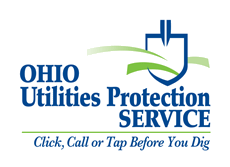By simply calling 8-1-1, you can notify Ohio’s one-call notification systems. This is a free service. The Ohio Utilities Protection Service coordinates with local utilities and the Oil and Gas Producers Underground Protection Service coordinates with oil and gas production facilities to have underground lines marked, so you know ahead of time where it is safe to dig. They’ll also tell you about any other companies that you must notify before you begin digging. Not only will doing so avoid headaches and make your job easier, but you avoid potential utility outages, repair costs and serious or even fatal injuries.

Be Safe, Call First
Accidentally digging into utility lines is extremely dangerous and can result in serious injury or death. Such accidents also endanger others and can disrupt essential utility services that people rely on every day.
-
Be Safe – Protect yourself and those around you by calling 811 and avoid causing an accident.
-
Call First – Underground power lines, communication cables, gas lines, water lines or other utilities may lie at various depths below the surface of your property or areas of planned excavation. It is important to be safe before excavating by alerting the appropriate state notification center and allowing time for the area utility companies to mark the location of their underground facilities.
-
Respect Marks – It also is important to respect the marks indicating the presence of underground utilities. Excavation should be carefully performed only after confirming that all utilities have marked the location of their facilities. Remember that locating underground utility lines is not an exact science and location marks have varying bands of required accuracy, depending on a particular state’s requirements. These can range from 18 to 24 inches from the actual facility.
-
One-Call System – In addition to the national One-Call number 811, all states provide a One-Call communication system that provides one telephone number for excavation contractors and the general public. Please: Always call when you intend to excavate, blast or do any tunneling work.
Does My Project Require Me to Call 811?
If your plans involve any sort of digging or excavating, be sure to call 811 ahead of your scheduled start. By law, everyone —including homeowners—must contact the Ohio Utilities Protection Service, the Oil and Gas Producers Underground Protection Service, 811 or 1-800-362-2764, at least 48 hours but no more than 10 working days (excluding weekends and legal holidays) before beginning any digging on their property. The depth of utility lines varies and there may be multiple utility lines in a common area, so it’s always smart to have them marked.
Lines have been hit digging, such things as, fence post holes, anchoring supports for decks and swing sets, planting trees, removing tree roots and driving landscaping stakes into the ground. By not calling, you’re not only breaking the law, but also risking injury to yourself, your family or work crew and the surrounding community.

